
Esposa de un trabajador migrante. No ha visto a su esposo en dos años. Aldea de Araván, región de Osh.
Todas las imágenes en este artículo pertenecen a Elyor Nematov y se usan con autorización. Algunas también han aparecido en Meduza [1] y The Guardian [2].
El proyecto de fotografía «Papá viene mañana» del fotógrafo Elyor Nematov, producido en el curso de varios meses en 2014, explora la vida de las familias de los trabajadores migrantes. Es el segundo capítulo de “Soy extranjero”, proyecto documental de fotografía que retrata diversos aspectos de la migración laboral de Asia Central a Rusia.
Nematov nació en la ciudad de Bukhara, que estaba en la Ruta de la Seda, en el vecino Uzbekistán, pero ahora vive y trabaja en Kirguistán donde transcurre el capítulo ‘Papá viene mañana’.
Además de Tayikistán al sur, el diminuto Kirguistán es el país de Asia Central donde la mayor proporción de la población vive y trabaja en Rusia. En estos países con una población combinada de menos de 14 millones de personas, el dinero que los migrantes envían a casa equivale a la mitad y el tercio del PIB respectivamente, lo que los hace los dos países que más dependen de remesas en el planeta.

Cena familiar. Aldea Chek, región de Batken.
«Papá viene mañana» es una frase que millones de niños en Asia Central escuchan cuando hacen las preguntas «¿Dónde está mi padre? ¿Cuándo volverá a casa?»
Los que se quedan para cuidar a los niños usan esta frase una y otra vez. Y nadie sabe cuándo será ese «mañana».
La historia con fotos de Nematov es sobre familias de trabajadores migrantes –en su mayoría, mujeres y niños– que cuidan del hogar y se ganan la vida mientras sus seres queridos tratan de ahorrar dinero en Rusia. Muchos niños de Asia Central están creciendo sin sus padres en su vida, lo que supone una enorme carga de cuidado sobre las madres, hermanas mayores y abuelos en particular.

Debido a una sequía excesiva, una mujer cava agujeritos alrededor de árboles de albaricoque para acumular agua de lluvia. Los albaricoques son la principal, y a veces única, fuente de ingresos para muchas familias en Batken. Aldea Djangigen, región Batken.
Además, luego de la reciente caída económica en Rusia, que provocó una masiva depreciación del rublo* contra el dólar y otras importantes monedas extranjeras, los migrantes están enviando a casa cada vez menos dinero, y algunos están regresando a casa desesperados, En regiones como Osh y Batken, no hay trabajos espérandolos a su llegada.
Estos lugares son los ambientes principales para las poderosas imágenes de Nematov, que captan simultáneamente la belleza y la dureza de la vida fuera de Biskek, la ciudad capital de Kirguistán, y enfatiza su constante y continua vulnerabilidad.
* La caída del rublo ruso también tuvo un fuerte impacto en la moneda de Kirguistán, el som. Cuando se recopilaron estas historias, el som valía entre 45 y 55 con referencia al dólar estadounidense. Actualmente, está más cerca de los 75 por dólar. Las pensiones y sueldos a que se refiere la historia de la foto pueden haberse reajustado desde entonces.

Mahfirat, mujer de 60 años, recoge ladrillos para la restauración de una casa destruida. Ciudad de Osh, región Osh.

Una mujer mayor excava barro de un camino destruido cerca de su casa. Ciudad de Osh, región de Osh.
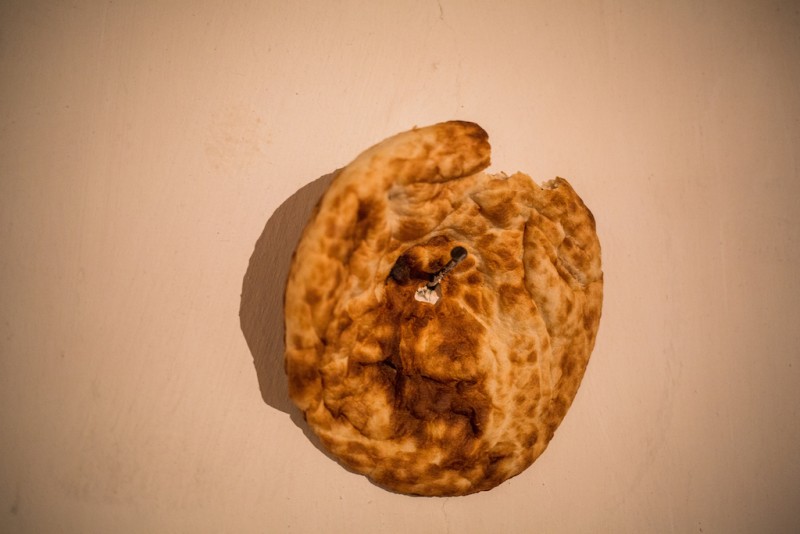
Un hombre a punto de embarcarse en un largo viaje come pan hecho en casa. Los habitantes del valle Ferghana creen que dejar la porción que no se comió hará que el viajero regrese a casa al final. Hasta entonces, el pan se cuelga en la pared de la casa. Aldea de Chek, región Batken.
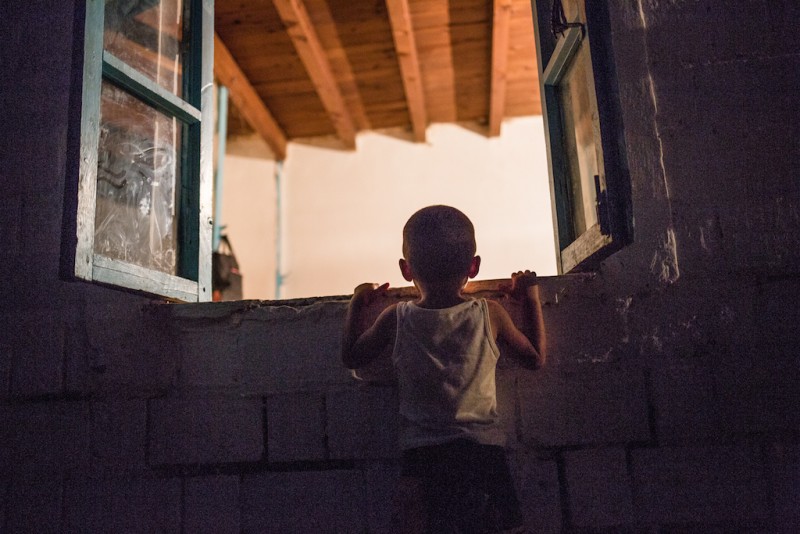
Niño dirigiéndose a su madre. Aldea de Chek, región de Batken.

Baysiya, 45 años, cría a sus tres nietos. Sus padres trabajan como jardinera y conductor de camión respectivamente en algún lugar de Rusia. El niño menor tiene seis meses, el mayor tres años. El único ingreso de Byasiya es vender mantequilla, que obtiene de su única vaca. «Sus padres trabajan”, les dice a sus nietos cada vez que se lamentan por la falta de sus padres. “Regresarán un día, cuando tenga que ser…”. Aldea de Djangijer, región Batken.

Mazur, 55 años, se encarga de sus cinco nietos. Sus padres trabajan constantemente en Rusia. Ciudad de Osh, región de Osh.
![Mahfirat, 60 years old, raises her three grandchildren. She receives a monthly state pension of 2,700 Kyrgyz soms [$40]. “'Look at the moon. Your parents are looking back at youfrom there,' I say to the children. And then every time the moon is full, they look up...” Osh city, Osh oblast.](https://globalvoices.org/wp-content/uploads/2015/12/10-800x534.jpg)
Mahfirat, 60 años, cría a sus tres nietos. Recibe una pensión mensual del estado de 2,700 soms kirguisos [$40]. “Miren la luna. Sus padres los ven desde allá’, les digo a los niños. Y cada vez que hay luna llena, ellos miran…”. Ciudad de Osh, región de Osh.
![Tologon, 63 years old, takes care of her two grandchildren, one six months old, the other two years old. “They often talk to their mother on the phone,” she says. “I say [to the children] that their mother will arrive in the summer. When summer comes, I say she will come in the winter, and she'll bring a lot of money...” Aravan rayon, Osh oblast.](https://globalvoices.org/wp-content/uploads/2015/12/11-800x534.jpg)
Tologon, 63 años, se encarga de sus dos nietos, uno de seis meses y el otro de dos años. “A menudo hablan con su mamá por teléfono”, dice. “Les digo [a los niños] que su madre llegará en el verano. Cuando llega el verano, digo que vendrá en invierno, y que traerá mucho dinero…”. Distrito de Araván, región de Osh.

Muchacha de 14 años cuida a la hija de su hermana mayor. La hermana se divorció y fue a Rusia a encontrar trabajo. Aldea de Karabag, región de Batken.

Niño de seis años, cuyos padres se divorciaron después de ir a trabajar a Rusia. Es más, su padre empezó una relación con otra mujer y luego abandonó a su madre. Aldea de Chek, región de Batken.

Niño de tres años, su padre fue sentenciado a prisión de tres a cinco años en Rusia por la muerte no intencional de un colega en una construcción. Distrito de Aravan, región Osh.

En la aldea Karabag, no quedan hombres, solamente los ancianos y los niños. Aldea Karabag, región Batken.
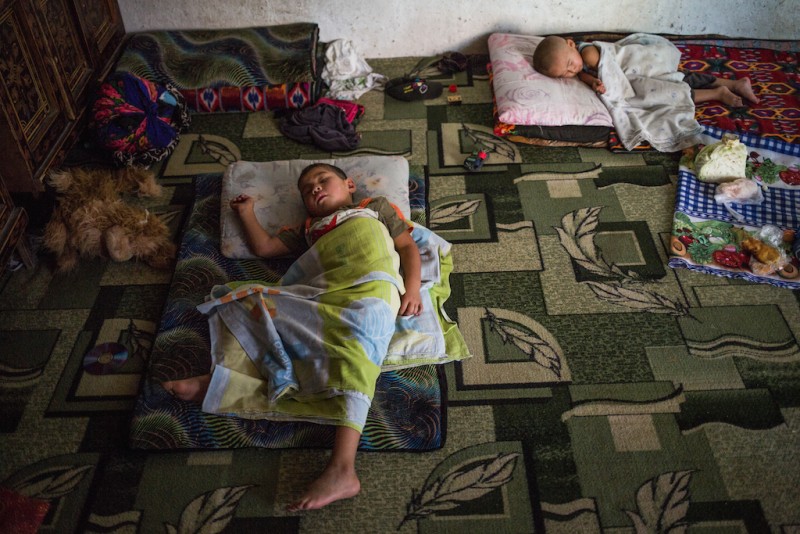
Hijos de trabajadores migrantes durante una pausa para el almuerzo. Aldea Karabag, región Batken.

Cena familiar de trabajadores migrantes. Aldea Djangijer, región Batken.
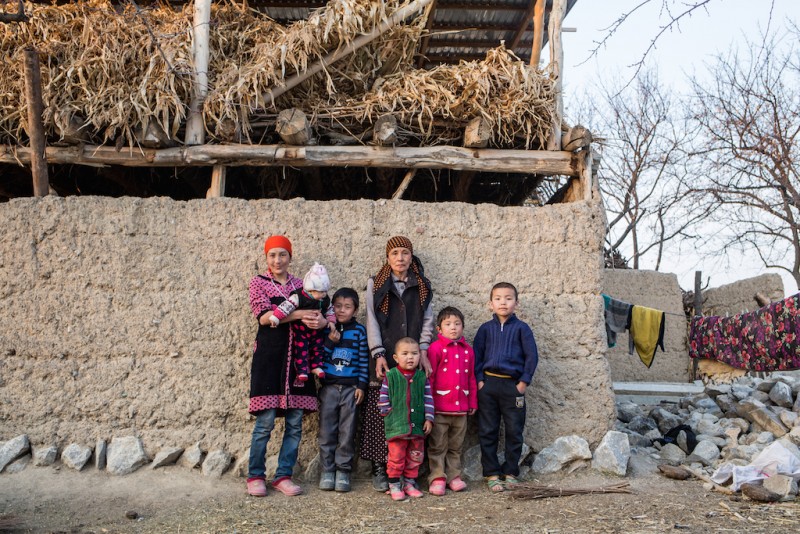
Laila, 70 años, cría a sus cuatro nietos. Sus padres han estado trabajando en Rusia más de tres años. Laila recibe del estado una pensión mensual de 3400 soms kirguisos ($44). “Cada vez que un avión vuela por el cielo, los niños me preguntan ‘¿Tal vez son nuestros padres que regresan?’ Y yo les digo: ‘Sus padres vendrán, tengan paciencia'…”. Aldea Djangijer, región Batken.

Hijo de un trabajador migrante. Aldea Karabag, región Batken.
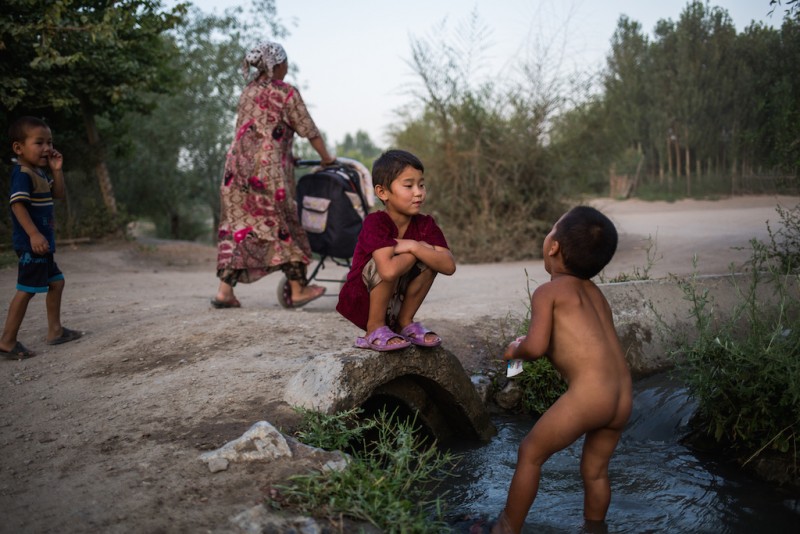
Hjos de trabajadores migrantes se bañan en un aryk (arroyo) cerca de su casa. Aldea Chek, región Batken.

Tolokon, 53 años, no ha visto a su esposo desde hace siete años. Según Tolokon, se fue a Rusia a trabajar pero nunca ha podido enviar dinero. Ella ha criado sola a sus tres hijas. La hija mayor se divorció y se mudó a Rusia, y dejó a una hija de seis meses para que Tolokon la críe. “Mi nieta a menudo dice: ‘Mamá-Mamá, Papá-Papá’, y su padre, aunque vive en una aldea cercana, nunca visita a su hija, se ha vuelto a casar…”. Aldea Karabag, región Batken.

Manzura, 55 años, cuida a sus cinco nietos. Sus padres se divorciaron por el alcoholismo del esposo, y su madre se fue a trabajar a Rusia. Manzura recibe una pensión mensual de 3,000 soms kirguisos ($39). “Les digo que su madre vendrá cuando tenga vacaciones. Dejaron de preguntar por su padre…”. Ciudad de Osh, región de Osh.

Madre con un bebé. Es muy difícil conocer a un joven en edad de trabajar en una aldea kirguisa, pues la mayoría ha ido a Rusia a buscar trabajo. Aldea Chek, región Batken.

Hijos de trabajadores migrantes recogen huevos. Dejados por sus padres, desde temprana edad los niños a menudo intervienen en tareas domésticas y actividad de bajo nivel económico. Distrito de Araván, región Osh.

Oyimnisa, 60 años, cría sola a sus tres nietos. “La nieta menor no recuerda a su madre, tenía solamente ocho meses cuando los dejó y se fue a Rusia. Así que no pregunta por su madre”. Aldea Djangijer, región Batken.
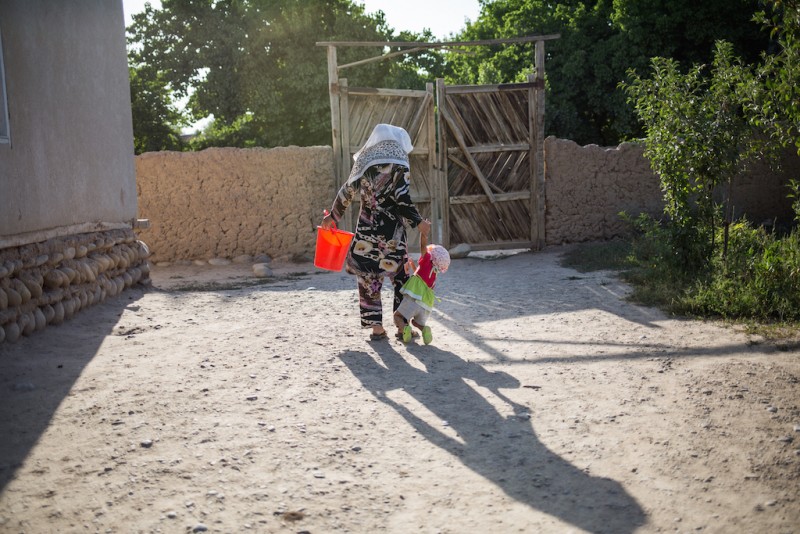
Niña de 14 años cuida a la hija de su hermana mayor. La hermana se divorció y fue a Rusia a buscar trabajo. Aldea Karabag, región Batken.
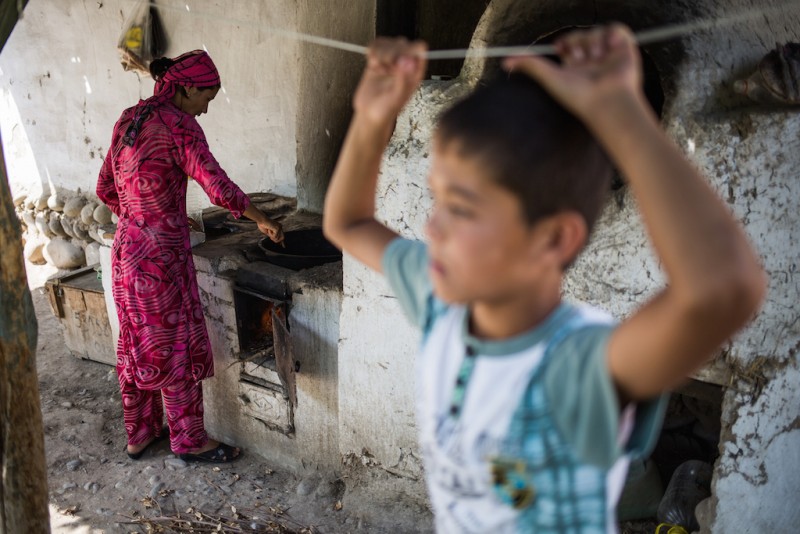
Hijos de un técnico sanitario que vive en un pequeño remolque en algún lugar de Moscú. Sus tres hijos y esposa esperan su regreso en casa. Distrito de Araván, región Osh.
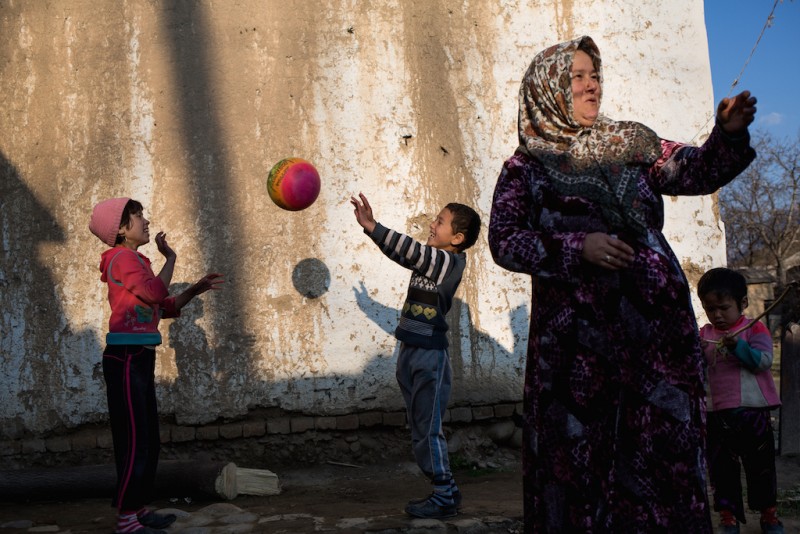
Familia de un trabajador migrante que está preso en Rusia entre tres a cinco años por la muerte no intencional de un colega en una construcción. La madre, Mastura, se gana la vida ayudando a sus vecinos con las labores domésticas y lavando platos en bodas. La hija menor tenía solamente una semana cuando el padre se fue a trabajar. Distrito de Araván, región Osh.

Laily, de 70 años, cría a sus cuatro nietos. Sus padres han estado trabajando en Rusia tres años. Laily recibe del estado una pensión mensual de 3,000 soms kiguisos ($39).

Niños jugando fútbol en un campo. Los estudiantes recién graduados de tercer a quinto grado (entre ocho y once años) son los más vulnerables a la migración laboral. Algunos hasta empiezan a planear su viaje a Rusia mucho antes de graduarse. Ciudad de Isfana, región Batken.
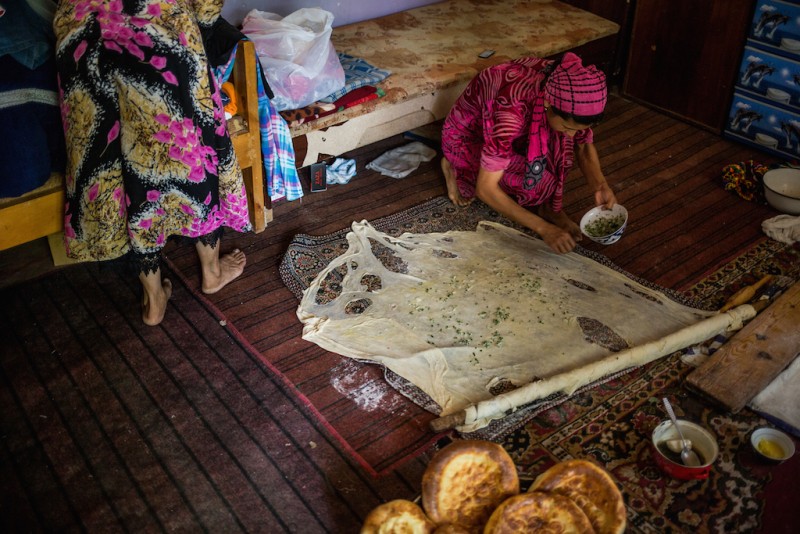
Los hijos de un plomero que vive en un pequeño remolque en algún lugar en Moscú. Sus tres hijos y esposa esperan su regreso en la casa familiar. Distrito de Araván, región Osh.

Mujeres cocinando sumalyak, plato tradicional de primavera. Ciudad de Osh, región de Osh.

Familia de un trabajador migrante que está preso en Rusia entre tres a cinco años por la muerte no intencional de un colega en una construcción. La madre, Mastura, se gana la vida ayudando a sus vecinos con las labores domésticas y lavando platos en bodas. La hija menor tenía solamente una semana cuando el padre se fue a trabajar. Distrito de Araván, región Osh.

Niña de un año, sus padres la dejaron al cuidado de su abuela. La abuela le hizo una cuna instalando un enrejado alrededor de una cama. Como no puede cuidar a su nieta todo el tiempo, la abuela inventó este aparato para asegurarse de que la niña no esté por ahí cuando ella no esté. Aldea de Karabag, región Batken.
![Savrinisa, 54 years old, raises her three grandchildren. Because of the recent economic crisis in Russia, her children are unable to repatriate money. The family's only source of income now is cultivating a small field of tobacco leaves. Djangijer village, Batken oblast. “I tell them that their parents will come soon and will bring them many sweets, chocolates. They call their children once a week. Their mother gave birth to another son there, so they will bring another child [when they next return]. Previously, their parents sent money regularly, but lately I we must survive on my pension. The only way to make extra money is this tobacco garden...”](https://globalvoices.org/wp-content/uploads/2015/12/35-800x534.jpg)
Savrinisa, 54 años, cría a sus tres nietos. Por la reciente crisis económica en Rusia, sus hijos no pueden enviar dinero, La única fuente de ingreso de la familia ahora es cultivar un pequeño campo de hojas de tabaco. Aldea Djangijer, región Batken. “Les digo que sus padres vedrán pronto y que les traerán muchos dulces, chocolates. Llaman a sus hijos una vez a la semana. Su madre tuvo otro hijo allá, así que traerán a otro niño [cuando regresen]. Antes, sus padres enviaban dinero con frecuencia, pero ahora debo sobrevivir con mi pensión. La única manera de ganar más dinero es este jardín de tabaco…”.
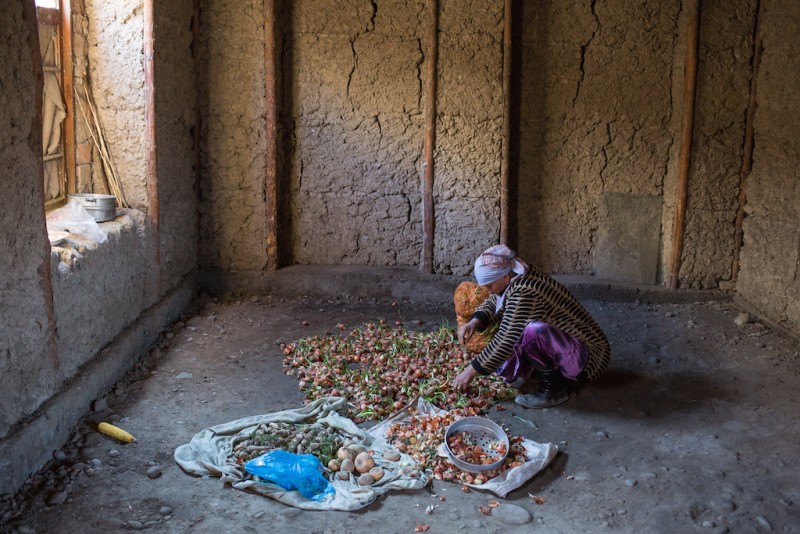
Madre de un trabajador migrante que ha estado esclavizado en Kazajistán durante nueve años pela ajos. Distrito Araván, región Osh.

Tolokon, 53 años, compró un becerro con el dinero que envía su hija desde Rusia. Apenas una semana después del nacimiento, la madre del becerro murió. Aldea Karabag, región Batken.

Klara, 26 años. Su madre murió de un infarto poco antes de regresar a casa de Moscú. Un mes después, su padre murió por complicaciones debidas al alcoholismo. Klara tiene enanismo. Sueña con convertirse en cosmetóloga y casarse. Ciudad de Osh, región Osh.

La nuera de Savrinisa, 23 años, arregla la casa. Todos los hombres de su familia, incluido su esposo, han ido a Rusia a buscar trabajo. Aldea Djangijer, región Batken.
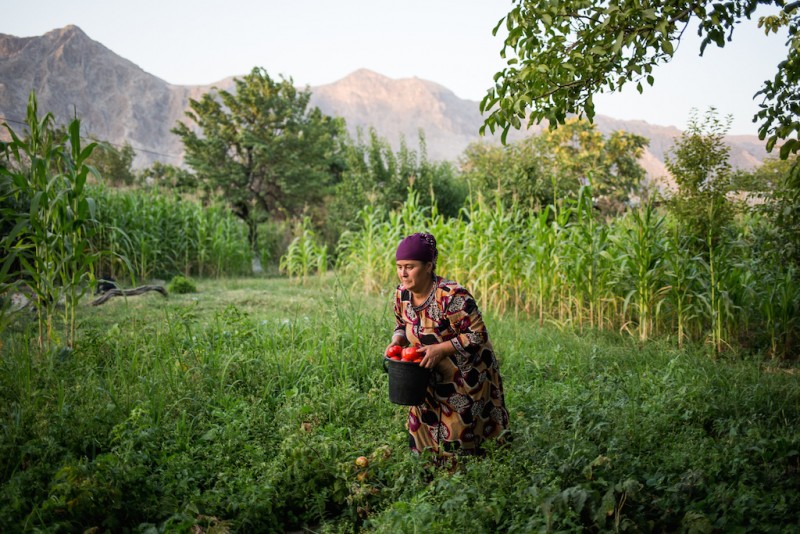
Mastura, esposa de Familia de un trabajador migrante que está preso en Rusia entre tres a cinco años por la muerte no intencional de un colega en una construcción, recoge tomates para ganar más dinero. Distrito de Araván, región Osh.


Choyhona, salón de té tradicional uzbeko, ocupado por clientas kirguisas. Normalmente, las choyhonas eran exclusivamente para hombres, pero con tantos hombres trabajando en Rusia, las mujeres han asumido el negocio. Distrito de Araván, región Osh.

Una mujer camina a través de un pequeño bosque de árboles talados para leña del invierno. Aldea de Djangijer, región Batken.

Mahfirat, 60 años, renueva una casa que sufrió daños cuando sus cimientos empezaron a deteriorarse. Todos los hijos de Mahfirat trabajan en Rusia, y su esposo está enfermo y no puede hacer trabajo duro. Ciudad de Osh, región Osh.

Ainysa, 60 años, y su nieto. Todos sus hijos trabajan en Rusia. Aldea Chek, región Batken.

Akmal, 30 años, construye una nueva casa mientras cría a sus cuatro hijos, y a dos niños de un vecino. Normalmente, son las mujeres las que se quedan pero la esposa de Akmal es una de las que ha partido a Rusia. Trabaja como camarera en uno de los innuerables cafés de Moscú. Ciudad Batken, región Batken.

Batyr, 32 años, construye una nueva casa mientra cría a sus dos hijas. Normalmente, son las mujeres las que se quedan pero la esposa de Akmal es una de las que ha partido a Rusia. Trabaja como camarera en uno de los innumerables cafés de Moscú. Ciudad Batken, región Batken.

Anarbek, 27 años, estuvo esclavizado en Kazajistán durante nueve años. Salió de Araván a los 17 años. En Kazajistán, fue obligado a vivir en un diminuto espacio cerrado e hizo duro trabajo manual sin ninguna compensación. Hasta lo vendieron varias veces a diferentes personas. Sus padres lo buscaron infructuosamente, y hasta temieron que hubiera muerto. Afortunadamente, Anarbek pudo escapar, literalmente corriendo, del último lugar de su servidumbre. Distrito de Araván, región Osh.

La madre de Anarbek, 50 años. La mujer que facilitó el arreglo que llevó inicialmente a Anarbek a Kazajistán vivía –y vive– en Araván. A lo largo de los nueve años de su odisea, la madre de Anarbek trató sin éxito de obtener respuestas de esta mujer, que a veces reaccionaba violentamente. Distrito de Araván, región Osh.

Madre de Anarbek, 50 años. Distrito de Araván, óblast Osh.

Anarbek, 27 años. Con la ayuda de un chofer solidario de uno de los lugares en los que fue obligado a trabajar, Anarbek pudo escapar a la frontera kazajo-kirguisa. Sin embargo, como ya no tenía su pasaporte, los guardias fronterizos kazajos se negaron a que saliera del país. Desesperado, cruzó la frontera ilegalmente nadando por el río Chu (Chuy). Era invierno. Distrito de Araván, región Osh.

Asylbek, unos 30 años, sostiene un retrato de su hermano que desapareció sin dejar rastro a comienzos de 2013, luego de trece años de trabajar en Rusia. Su madre murió en marzo de 2013, y la familia no tiene manera de informarle. Ciudad de Batken, región Batken.
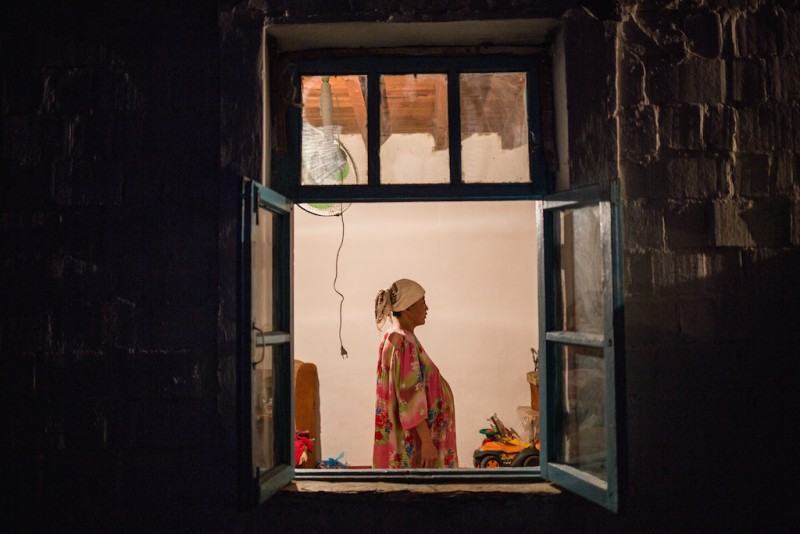
Viuda embarazada de un trabajador migrante, aproximadamente 30 años. Aldea Chek, región Batken.

Begimay, 16 años, se encarga de los tres hijos de su hermana mayor. Su hermana mayor, sus hermanos y su padre trabajan todos en Rusia. Aldea Djangijer, región Batken.

Hijos de un técnico sanitario que viven en un pequeño remolque en algún lugar de Moscú. Sus tres hijos y esposa esperan su regreso en casa. Distrito de Araván, región Osh.

Begimay, 16 años, y su madre Baysiya, 45 años, se encargan de los tres hijos de su hermana mayor. Su hermana mayor, sus hermanos y su padre trabajan todos en Rusia. Aldea Djangijer, región Batken.
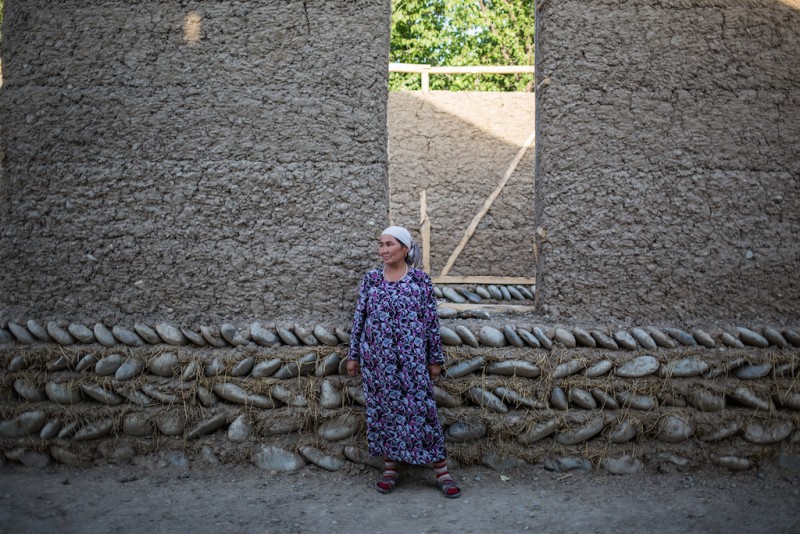
Aliya, 45 años. Dos de sus hijos y su esposo trabajan en Rusia. Ha estado construyendo su casa usando el dinero que le enviaban a ella. Aliya ha dirigido directamente el proceso de construcción. Aldea Karabag, región Batken.
![Tologon, 63 years old, takes care of her two grandchildren, one six months old, the other twob years old. “They often talk to their mother on the phone,” she says. “I say [to the children] that their mother will arrive in the summer. When summer comes, I say she will come in the winter, and she'll bring a lot of money...” Aravan rayon, Osh oblast.](https://globalvoices.org/wp-content/uploads/2015/12/60-800x534.jpg)
Tologon, 63 años, se encarga de sus dos nietos, uno de seis meses y el otro de dos años. “A menudo hablan con su mamá por teléfono”, dice. “Les digo [a los niños] que su madre llegará en el verano. Cuando llega el verano, digo que vendrá en invierno, y que traerá mucho dinero…”. Distrito de Araván, región de Osh.